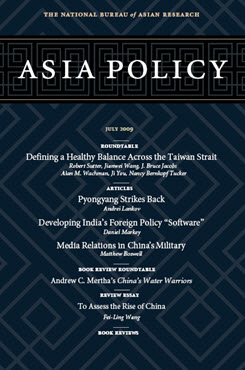Defining a Healthy Balance Across the Taiwan Strait
Should the warming of relations between Taiwan and China affect Washington’s definition of a healthy military balance? Does the need for cooperation between the United States and China alter the determination of what constitutes a healthy balance? Asia Policy invited a number of distinguished scholars with diverse perspectives to offer their thoughts on these questions in an effort to increase the number of informed voices in the debate over the future of U.S.-Taiwan relations.
SUMMARY
In praising the October 2008 U.S. arms sale to Taiwan as an important response to the island’s defense needs, then presidential candidate Barack Obama articulated the need to maintain a “healthy balance” across the Taiwan Strait. Questions persist, however, about what exactly should constitute this healthy balance between the mainland and Taiwan. The U.S. Congress, for its part, has articulated Washington’s “unwavering commitment” to providing Taiwan with sufficient defensive weaponry to deter coercion by the mainland. President Obama’s top diplomat to Taiwan has reiterated this commitment, stating that Washington’s position in this regard “remains unchanged.”
Is a healthy balance, then, defined purely in terms of weapon sales? If not, to what extent should other considerations play a role in determining this balance? Recent years have seen dramatic changes in the broader context of U.S.-Taiwan relations. Taiwan president Ma Ying-jeou has asserted his aim to conduct “surprise-free and low key” foreign policy, and has emphasized the need to “move cross-strait relations forward and beyond the hostility and brinkmanship” of the preceding Chen Shui-bian administration. This approach has precipitated an unprecedented upswing in Taiwan’s relations with the mainland, characterized by the inauguration of direct charter fights across the strait, two rounds of high-level bilateral talks, investment agreements, discussions of future military confidence-building measure (CBM), and the possible signing of a comprehensive trade pact. Should this warming of relations affect Washington’s definition of a healthy military balance?
Alongside the steady cross-strait rapprochement, the ongoing economic crisis has highlighted China’s emergence as a major player on the global stage with expanding economic and military clout. Washington’s capacity to confront the current economic crisis as well as advance a host of other interests in the region and beyond increasingly will require the cooperation of Beijing. Does the need for cooperation between the United States and China alter the determination of what constitutes a healthy balance?
Asia Policy has invited a number of distinguished scholars with diverse perspectives to offer their thoughts on these questions in an effort to increase the number of informed voices in the debate over the future of U.S.-Taiwan relations.
About Asia Policy
Asia Policy is a peer-reviewed scholarly journal presenting policy-relevant academic research on the Asia-Pacific that draws clear and concise conclusions useful to today’s policymakers. Asia Policy is published quarterly in January, April, July, and October and accepts submissions on a rolling basis. Learn more


